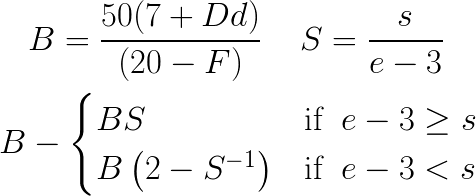Difference between revisions of "Encumbrance rating"
m (→Penalties) |
|||
| Line 1: | Line 1: | ||
| − | {{ | + | {{version017}} |
An '''encumbrance rating''' is a penalty applied by almost all body armour and [[barding]]s. This is a measure of how much your defensive equipment gets in the way of your attacks, spellcasting, and attempts to [[ev]]ade enemy attacks. Multiple sources of encumbrance rating stack with each other. [[Shields]] also have a penalty, but it is handled differently and is never actually named in game. | An '''encumbrance rating''' is a penalty applied by almost all body armour and [[barding]]s. This is a measure of how much your defensive equipment gets in the way of your attacks, spellcasting, and attempts to [[ev]]ade enemy attacks. Multiple sources of encumbrance rating stack with each other. [[Shields]] also have a penalty, but it is handled differently and is never actually named in game. | ||
Revision as of 14:22, 19 September 2015
An encumbrance rating is a penalty applied by almost all body armour and bardings. This is a measure of how much your defensive equipment gets in the way of your attacks, spellcasting, and attempts to evade enemy attacks. Multiple sources of encumbrance rating stack with each other. Shields also have a penalty, but it is handled differently and is never actually named in game.
In general, the heavier your equipment, the greater the encumbrance rating will be. You can reduce the impact of your encumbrance rating by increasing your strength or Armour; generally speaking, having strength equal to the item's encumbrance rating will significantly reduce the penalty it applies, though further strength will still provide you with diminishing returns.
See the Table of Armours for numerical details on all items with encumbrance ratings.
Contents
Penalties
Adjusted body armour penalty
Where b(S) is the base evasion penalty function over a scale, e is the encumbrance rating of the armour, S is an arbitrary scale the base is used at for the particular penalty, a is the armour skill of the subject, and s is the strength of the subject.
This penalty is not applied directly, rather it is necessary for calculating the to hit, evasion, and spell casting penalties, which each have a specific scale they use for the S value.
Armour to hit penalty
This amount reduces the accuracy of your melee attacks and decreases the chance of performing an unarmed auxiliary attack without the corresponding mutation.
First the result of the division by 20 is randomly rounded up or down, then a value from 1 to the penalty is randomly selected as the final penalty applied for each attack. Typically this means that the highest possible penalty value is much less likely than any other roll.
Adjusted evasion penalty
This amount is subtracted from your evasion along with other factors such as your size and dodge skill before being stepped down.
Dodging penalty
This penalty makes it harder to get some evasion from your dodging skill, and does nothing if you have not trained that skill.
The dodge penalty is only applied if the encumbrance rating is over 3, at which point if your strength is lower than the encumbrance rating then this is subtracted from your dodge bonus, otherwise if your strength is larger or equal to the encumbrance rating then your dodge bonus is scaled by the penalty.
Stealth penalty
This penalty is subtracted from your stealth score.
Spellcasting penalty
If this added to your shield penalty is positive then it is added to your failure chance. See spell success for more information.
History
Armour no longer slows down unarmed melee attacks, and some of the mathematics have changed between 0.13 and 0.17.
Encumbrance ratings were introduced in 0.13, replacing the EV penalty system.


